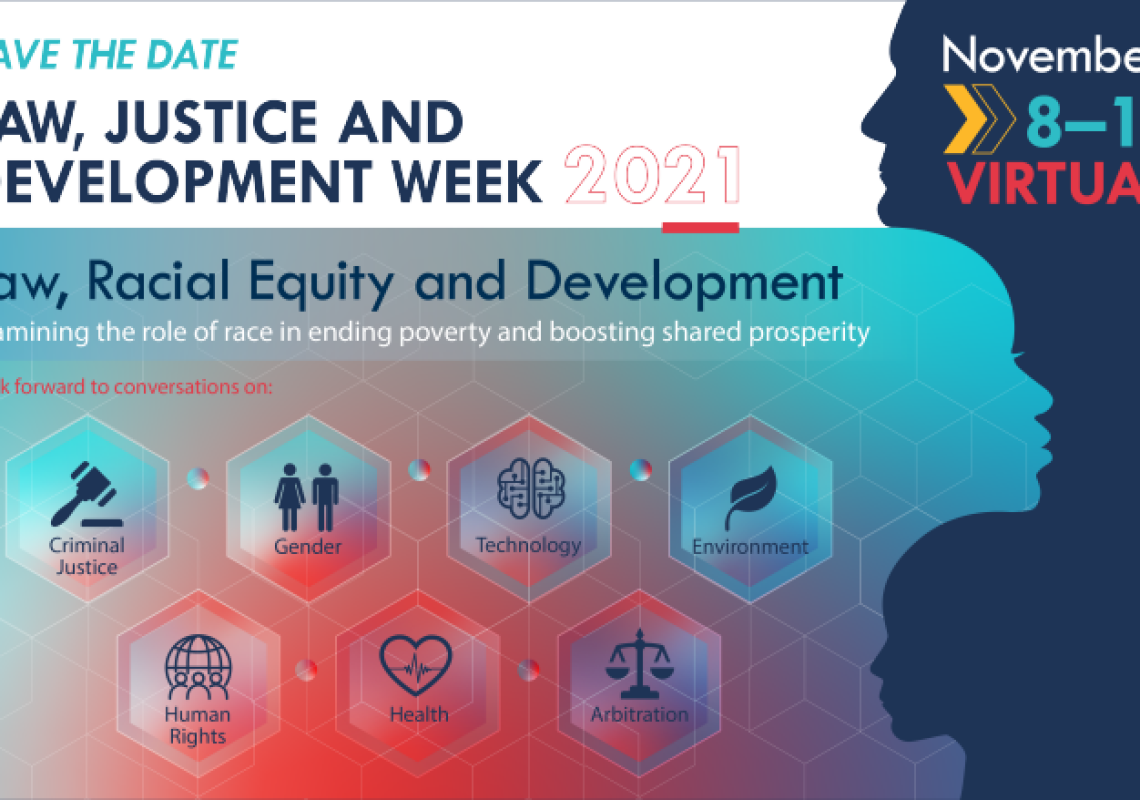With 189 member countries, staff from more than 170 countries, and offices in over 130 locations, the World Bank Group is a unique global partnership: five institutions working for sustainable solutions that reduce poverty and build shared prosperity in developing countries.
The World Bank Group works in every major area of development. We provide a wide array of financial products and technical assistance, and we help countries share and apply innovative knowledge and solutions to the challenges they face.
We face big challenges to help the world’s poorest people and ensure that everyone sees benefits from economic growth. Data and research help us understand these challenges and set priorities, share knowledge of what works, and measure progress.
A session co-organized with Thomson Reuters
An effective legal system is not just good for those who deal with courts, but for everyone. Digital justice systems improve access to justice, which has a direct impact on racial equity, and by strengthening the rule of law, support countries to achieve SDG 16 goals.
Take for example South Africa and Kenya. Thomson Reuters supported trials of a digital justice system with the Kenyan Court of Appeals, and in South Africa is delivering digital justice across the civil justice sector.
Their systems allow the creation and presentation of a fully digital hearing file including multi-media evidence, collaboration tools for enhanced pre-trial preparation. and ease to use presentation tools for hybrid and virtual hearings. Judges are increasingly at the forefront of these modernization efforts, and their actions are driving digital access to court proceedings and making court processes more negotiable and understandable.
In Canada, First Nations members are using digital justice to pursue aboriginal land rights claims against the government. Digital justice systems are empowering more people, especially disadvantaged populations—in improving racial equity and access to justice.
From body-worn cameras to digital courtroom systems, digitization has the potential to improve transparency, accountability and auditability. In this session, guest speakers will consider the merits of different initiatives and the barriers to adopting these in different societies.
Not everyone has reliable internet access or devices which are critical to be fully participatory in these new court systems. Equally, many countries are held back by budgets, social factors and immature IT systems. The panel will consider the barriers and what if anything international organizations can do to support change.
Master Morris-Alleyne of the Judiciary of Trinidad and Tobago is responsible for modernization of the Trinidad and Tobago Courts, introducing case-flow management in the criminal courts and most recently implementing the CaseLines digital justice system to facilitate virtual hearings. Master Christie-Anne Morris-Alleyne was formerly Assistant Registrar for the Supreme Court. Master Morris Alleyne is a graduate of the CEDP programme at the National Center For State Courts in Virginia.
Hon. Geoffrey Kiryabwire has served as a Justice of the Court of Appeal in Uganda since 2013 and is also an appellate judge with the East African Court of Justice. Previously he was the head of the Commercial Division of High Court of Uganda. Hon. Geoffrey Kiryabwire is unusual in having a commercial background outside the legal profession, having served first as general counsel and then CEO of the Pan World Insurance Company for 9 years. In the 1990’s Hon. Geoffrey Kiryabwire spent a year with the International Development Law Association, and more recently chaired the judicial committee for the procurement of the Electronic Case Management information system for Uganda.
Hon. Sam Thumma has served on the Arizona Court of Appeals Division 1 since 2012, where he also serves as Chief Judge. Hon. Sam Thumma has a long history of involvement in modernization of justice systems and is a respected national and international leader. He is chair of the American Bar Association’s Judicial Division Appellate Judges Conference and serves on the Joint Technology Committee, appointed by the National Center for State Courts. In Arizona, he chairs the Arizona Commission on Access to Justice, co-chairs Arizona’s COVID-19 Continuity of Court Operations Workgroup (the Plan B Workgroup) and previously chaired the Arizona Task Force on Court Management of Digital Evidence which led to the adoption in 2020 of a digital evidence system in the Arizona Courts. He was named the 2021 Judge of the Year by Arizona Supreme Court.
David Jackson is a Senior Director with the CaseLines business in Thomson Reuters, supporting courts, litigators and prosecutors to manage virtual hearings by preparing and delivering hearing files and presenting documentary and video evidence. CaseLines has been delivering virtual hearings since 2014 for criminal, civil, child and juvenile protection and tribunal hearings around the world and for all criminal cases in England and Wales. David Jackson is Vice Chair of the Courts Advisory Committee of the Integrated Justice Information Systems Institute in the U.S. David has led digitization projects in the US, Canada, South Africa, Kenya and the Middle East including the successful digitization of 40+ prosecutor offices and 78 criminal courts in England. Previously, David Jackson had over 20 years experience, in senior management/partner positions at McKinsey & Co., Ernst & Young and Fujitsu Services.






